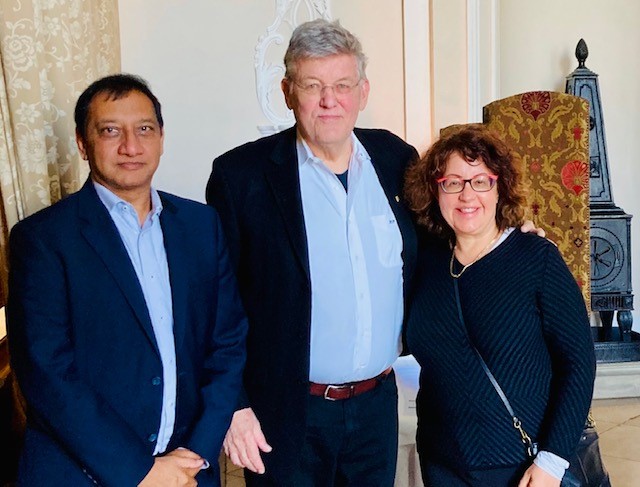IOE enriches evaluation debate at gLOCAL 2022 - IOE
Rome, 2 June 2022 – How to adapt international standards, practices, and evaluation criteria in the context of rural development; how to strengthen the complementarity between monitoring and evaluation for decision-making; and how to use Sensemaking and Participatory Narrative Inquiry (PNI) in evaluation: these were the discussions that the Independent Office of Evaluation of IFAD (IOE) contributed to during gLOCAL Evaluation Week 2022.
This year, IOE and its staff members were involved in three gLOCAL sessions. On 2 June, IOE hosted the event titled ‘A new tool for rural development evaluation practitioners – the 2022 IFAD Evaluation Manual’. On 1 June, Fabrizio Felloni, IOE Deputy Director, was among the speakers during the event titled ‘Using stories in evaluation: Participatory Narrative Inquiry and Sensemaking’. On 31 May, Kouessi Maximin Kodjo, IOE Lead Evaluation Officer, moderated a panel discussion during the event titled ‘Innovate in monitoring and evaluation to better meet the needs of decision-makers at the national level’.
IFAD’s Revised Evaluation Manual was presented on 2 June, as over sixty representatives of international organizations, governments of developing countries and evaluation practitioners came together to share insights on translating key 2030 Agenda concepts into evaluation practice, adapting evaluation criteria and standards to rural poverty alleviation, and addressing the needs of and opportunities for rural development and evaluation practitioners and institutional stakeholders.
“While the Manual has been conceived for IFAD staff and consultants, I am confident that it will be of interest to many rural development practitioners and evaluators outside IFAD, who may be working in a government, in an international organization, in an NGO, civil society organizations on in a private sector company”, noted Indran A. Naidoo, IOE Director.
The Manual draws from recent contributions on the theory and practice of evaluation, with special reference to the 2030 Agenda for Sustainable Development, and provides guidance on how to adapt international standards, practices, and evaluation criteria in the context of rural development, particularly when the end-clients of development interventions are smallholder farmers.
On 1 June, the use of Sensemaking and Participatory Narrative Inquiry (PNI) took centre stage, as participants were invited to ask questions and to share their own experiences with using stories in evaluation. Because a large number of stories are collected and self-interpreted, it is possible to conduct quantitative analysis of recurrent themes, perspectives and feelings emerging in the narratives. By combining elements of qualitative and quantitative research, these approaches help to make sense of complex and evolving realities.
Moving from the premise that there is often a disconnect between decision making and M&E systems, the event held on 31 May explored innovative approaches and changes that can attract and sustain the interest of more stakeholders for M&E at country level, to adapt to the needs of decision makers in terms of time, format and modalities of communication. The event’s panel, composed of high-level representatives with roles at the interface between institutions in charge of M&E and government decision-makers, drew on direct experience from Benin, Morocco, Tunisia and Senegal. Points presented by panellists and questions from participants show that, although each country context is specific, a commonality is the strong buy-in at a high governmental level that enables the adoption of adopting innovative solutions or approaches for effective national M&E systems, which can provide timely evidence for decision-making.
GLOCAL Evaluation Week was launched in 2019. In the short time since gLOCAL was launched, organizing partners from around the world have hosted nearly 1000 M&E focused events across five continents in multiple languages. The inspiration of gLOCAL Evaluation Week comes from the acknowledgement of two forces that are shaping today's evaluation landscape, where global knowledge shapes local evaluation practices and local experiences influence global evaluation thinking.
For further information, please contact Alexander Voccia [here]

